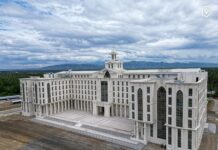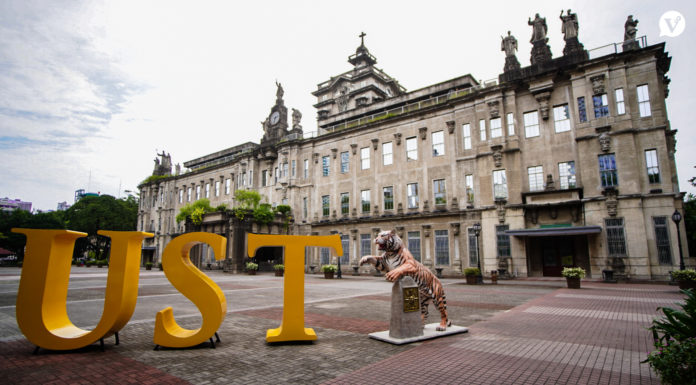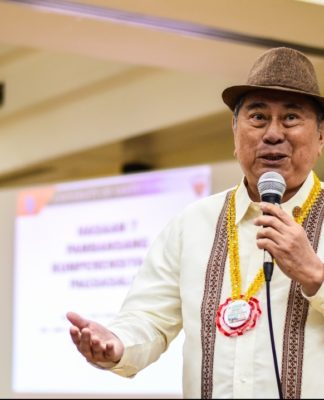WHAT do national hero Jose Rizal, National Artists Rolando Tinio, F. Sionil Jose and Bienvenido Lumbera, philosopher Emerita Quito, former senator Francisco Tatad, sculptor Julie Lluch, former New York Times correspondent Alice Colet-Villadolid, and Manila Bulletin columnist Jullie Yap Daza have in common?
They were all graduates of the defunct Faculty of Philosophy and Letters (Philets), whose star-studded alumni have banded together to form the Philets Foundation.
The Philets Foundation held a reunion last December 28.
“Keeping the spirit of Philets is most important,” said Spanish language professor Rogelio Obusan, a Philets alumnus. “That is the goal of the Philets Foundation.”
Philets was established in 1896, and it traces its lineage to UST’s 19th century civic philosophy program. When Rizal was in UST, he studied under a licentiate program that came to be known as Philets.
“It was from then that UST became the premiere school for philosophy,” Sinologist and philosophy teacher Alfredo Co said. “Not only that, it also held the most comprehensive and complete philosophy program in the land.”
A Philets graduate of 1948, PDI founder Eugenia Duran- Apostol said that the school not only gave her enduring memories, but also cultivated in her the proper ethics that helped her become an honest and brave journalist.
Philets offered Bachelor of Literature (Litt.B.) programs in Philosophy and Journalism. No wonder, its alumni have become the country’s top writers, artists, and humanists.
PDI columnist Conrad de Quiros said that back in the 1960’s, when he was a student at the Ateneo, Philets was known as “the big little college.”
“They were winning the Palanca awards and other literary contests – and they were still in college,” Quiros said. “They were literary and artistic visionaries.”
Philets was the school of overachievers. “We at the Ateneo stood in awe of Philets,” the columnist added.
In 1964, the UST administration, despite the protest of students, faculty members and alumni, merged Philets and the College of Liberal Arts into what is now the Faculty of Arts and Letters (Artlets).
And from there, it has been one long slide downhill, old timers said.
Mixed nuts
The merger changed the nature of the degree program from Litt.B. to Bachelor of Arts (A.B.).
Thus, the old Litt.B. programs in Philosophy, Journalism in English and Pilipino, and Literature major in Spanish were watered down into liberal arts courses, with a rather vague emphasis on reading and writing (“letters”) and the humanities.
More programs were also offered. Since Litt.B. was abolished, Literature became just one of the A.B. programs.
Aside from Literature, Philosophy and Journalism, Artlets now offers Asian Studies, Behavioral Science, Communication Arts, Economics, Legal Management, Political Science, and Sociology.
Artlets also offers five-year A.B.-B.S.E. programs in Sociology and Literature.
According to Indologist Josephine Acosta-Pasricha, a faculty member of Artlets and the UST Graduate School, the expansion diluted the mission, vision and focus of the college.
“Are we educating humanists, skillful community workers, or broadcast media workers?” asks Pasricha. “Even our Asian Studies majors do not necessarily go after graduation to International Studies. They end up working in airlines, travel agencies, and call centers, a far cry from the licentiate that Jose Rizal studied in UST for.”
Pasricha belonged to the last Philets batch of 1964.
“We were fortunate to have philosophical lineage from our teachers,” she said. “They were real masters of their subjects.”
Philets had only two sections per year-level. Because the classes were small, it was characteristic for Philosophy and Journalism juniors and seniors to combine sometimes in classes, Pasricha said.
Everybody knew one another, she added. And the Philets students helped each other in academics, extracurricular activities and community work.
The Philosophy majors took up courses in writing, just as the Journalism majors also took up courses in Philosophy.
Essayist-fictionist Cristina Pantoja-Hidalgo, now the vice-president for public affairs of the University of the Philippines, majored in Philosophy at Philets. Even internationally known Filipino film director Gil Portes, who finished Journalism at Philets, remembered enrolling in several Philosophy subjects.
“So the philosopher could write very well, just as the journalist also knew philosophy,” Pasricha said. “A Philets graduate would always be an excellent philosopher and writer, in the academe, journalism, and community service.”
The multiple skills of the Philets student are lacking in today’s Artlets student, Pasricha added.
Artlets officials do not agree with Pasricha.
“True, Artlets students nowadays focus on getting more information than getting the depth of information,” Artlets faculty president Reynaldo Reyes said. “But despite that fact, I think they show a lot of promise.”
Dean Armando De Jesus said it was necessary to change the orientation of Artlets.
“The degrees before focused only on one area: humanities,” De Jesus said. “But today, we offer 11 courses where areas not only include humanities, but also social science, management and education.”
But Reyes and De Jesus acknowledged the excellence of Philets.
“The Philets professors were incomparable,” Reyes said. “They had a rigid training in the arts and humanities.”
But Artlets professors today, Reyes added, have continued their studies in different universities, and “thus were comparably more exposed to different ways of teaching.”
“We cannot compare who is better or who is not,” Reyes said. “The Philets used to study using pen and paper alone, but today, students study with improving technology.”
“There are always good students in (Artlets),” De Jesus said. “But the idea of a good student has also changed. Good students of today are not only good in academics; they are also more articulate and competitive in technology.”
“Our students are good, but now, in a different way,” De Jesus added.
Despite the inroads of fancy technology in today’s education system, the Philets glory that relied on pen, paper and punditry seems ever brilliant and dazzling, casting a big shadow on the underachieving if insecure Artlets.
“Philets will always live as long as we, the alumni, are here, and our students continue what we taught them,” Obusan said. Rieze Rose T. Calbay and Mary Joy T. de Lara, with reports from Raychel Ria C. Agramon



















Good day, I think my late father, David Borje, was a member of the Philets in 1950. He was the Managing editor then. I wasn’t mindful of it until I googled my father’s name in one of your articles written by Gloria Garchitorena-Goloy, Philets & Vignettes. Thanks and more power..